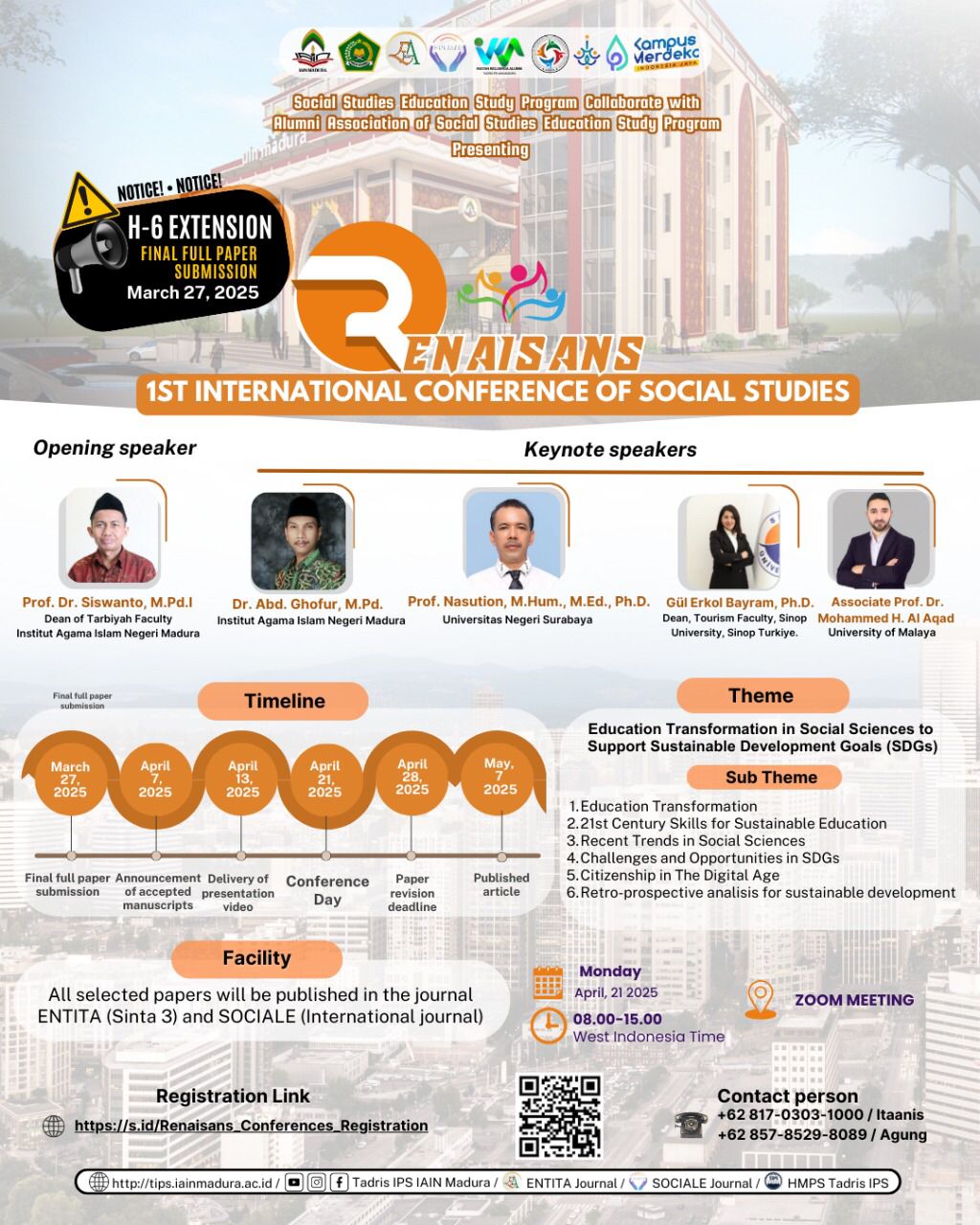Transformasi Media Lensatara: Google Lens dalam Pembelajaran Bagi Mahasiswa
 Abstract views: 2
,
Abstract views: 2
,
 PDF (Bahasa Indonesia) downloads: 3
PDF (Bahasa Indonesia) downloads: 3
Abstract
This research aims to describe the use of Google Lens in translating Arabic for students of the Foreign Language Development Program (FLDP) at IAIN Madura. This study focuses on three main aspects: effectiveness, efficiency, and translation accuracy using Google Lens. The research uses a descriptive approach, with data collected through questionnaires given to students and direct observation of the use of the application. The results indicate that the use of Google Lens is effective in helping students understand Arabic and efficient in terms of time and resources used. Although the translation accuracy does not reach 100%, students are still able to comprehend the meaning of the translated text. Therefore, Google Lens can be a useful tool in supporting Arabic language learning at IAIN Madura, although there is still room for improvement in terms of translation accuracy. This study contributes to the development of technology in foreign language education, particularly in the context of Arabic language teaching at higher education institutions.
Downloads
References
Alatas, M. A. (2024). Penggunaan AI dalam Pembelajaran Bahasa Madura pada Siswa Sekolah Dasar di Kabupaten Pamekasan. Ganesha: Journal of Applied Linguistics, 1(3), 174–185.
Alatas, M. A., & Albaburrahim. (2021). Penggunaan Teknik Modelling Digital untuk Meningkatkan Kemampuan Membaca Puisi. Jurnal Ibriez : Jurnal Kependidikan Dasar Islam Berbasis Sains, 6(2), 177–192. https://doi.org/https://doi.org/10.21154/ibriez.v6i2.160
Alatas, M. A., Romadhon, S., & Rachmayanti, I. (2024). Penggunaan Chat GPT dalam Pembelajaran Bahasa: Perspektif Mahasiswa Tadris Bahasa Indonesia IAIN Madura. Social, Humanities, and Education Studies (SHEs): Conference Series Https://Jurnal.Uns.Ac.Id/Shes, 7(3), 1–23.
Annisa, M. N., & Safii, R. (2023). Analisis Kebutuhan Belajar Bahasa Arab sebagai Bahasa Asing dalam Konteks Pendidikan Tinggi. ELOQUENCE : Journal of Foreign Language, 2(2), 313–328. https://doi.org/10.58194/eloquence.v2i2.861
Fitriyah, T., & Fauzi, M. F. (2020). Improving Quality of Arabic Translation Course through Jigsaw Cooperative Learning. Izdihar : Journal of Arabic Language Teaching, Linguistics, and Literature, 3(1), 17–30. https://doi.org/10.22219/jiz.v3i1.11033
Hidayat, T., & Asyafah, A. (2019). Konsep Dasar Evaluasi Dan Implikasinya Dalam Evaluasi Pembelajaran Pendidikan Agama Islam Di Sekolah. Al-Tadzkiyyah: Jurnal Pendidikan Islam, 10(1), 159–181. https://doi.org/10.24042/atjpi.v10i1.3729
Jonnadula Narasimharao, R Hariharan, E Sudha, Deepa Bisht, E. Mohan, Muntather Almusawi, Neelam Sanjeev Kumar, "The Impactful Role of ML Algo in the Field of Enactment Nostrum: An Intensive/Deep Review", 2024 4th International Conference on Advance Computing and Innovative Technologies in Engineering (ICACITE), pp.1407-1411, 2024.
Kamila, V. Z., Arinzha, V. T., Fadillah, M., & Anggara, M. A. R. (2023). Optimasi Google Search Engine dan Google Lens untuk Media Belajar Siswa dan Guru SMP IT Tursina Samarinda. Pengabdian Kepada Masyarakat Bidang Teknologi Dan Sistem Informasi (PETISI), 1(2), 51–54. https://doi.org/10.30872/petisi.v1i2.822
Latifah, R. H. (2024). ANALISIS SASTRA DALAM TERJEMAHAN AL- QUR ’ AN KARYA ARTHUR JOHN ARBERRY : THE HOLY KORAN. 4(1), 53–76.
Moleong, L. J. (2013). Metodologi Penelitian Kualitatif. Bandung: Rosdakarya.
Nirawana, I. W. S., Subastian, E., & Suwandi, B. P. (2024). Pelatihan Optimasi Google Search Engine dan Google Lens Untuk Media Pembelajaran Siswa SMK Negeri 18 Samarinda. 11(2), 170–176.
Pujilestari, Y. (2020). Dampak Positif Pembelajaran Online Dalam Sistem Pendidikan Indonesia Pasca Pandemi Covid-19. Adalah, 4(1), 49–56.
Rachmayanti, I., & Alatas, M. A. (2023). Pemanfaatan AI sebagai Media Pembelajaran Digital dalam Foreign Language Development Program (FLDP) IAIN Madura. GHANCARAN: Jurnal Pendidikan Bahasa Dan Sastra Indonesia, (November), 214–226. https://doi.org/10.19105/ghancaran.vi.11752
Rahman, M. H., & Natsir, T. (2024). Peran Teknologi dalam Pembelajaran SMK : Perspektif Guru tentang Manfaat dan Kemudahan Penggunaan . 7(2), 139–143.
Riza, A. N. (2024). Akurasi Hasil Terjemah Novel “Imra’Ah 'Inda Nuqṭati Aṣ-Ṣifr” Dengan Website “Deepl Translator.” Jurnal Sabda (Sastra Dan Bahasa), 2(1), 173–177.
Rohmatul, A., & Alatas, M. A. (2022). Efektivitas Model Blended Learning terhadap Pemahaman Menulis Cerpen dalam Pembelajaran Daring. GHANCARAN: Jurnal Pendidikan Bahasa Dan Sastra Indonesia, 3(2), 238–249. https://doi.org/10.19105/ghancaran.v3i2.5010
Romdani. (2024). Peningkatan kemampuan terjemah komunikatif kitab kuning pada jamaah masjid pondokgede bekasi. 5(3), 5565–5569.
Sarajar, D. R. (2022). Efektifitas Dan Efisiensi Pembelajaran Bahasa Jerman Sebagai Bahasa Asing Di Sma Negeri I Tondano. Kompetensi, 1(07), 644–654. https://doi.org/10.53682/kompetensi.v1i07.1999
Sudjani, D. H., & Gungun, G. (2020). Thariqah Mubasyarah : Metode Pembelajaran Bahasa Arab pada Perguruan Tinggi. Tatsqify: Jurnal Pendidikan Bahasa Arab, 1(1), 6–8. https://doi.org/10.16309/j.cnki.issn.1007-1776.2003.03.004
Sugiyono. (2011). Metode Penelitian Kuantitatif, Kualitatif dan R&D. Bandung: Alfabeta.
Wandikbo, M., & N.N Sitokdana, M. (2019). Perancangan Kamus Digital Bahasa Suku Nduga Berbasis Android. Jurnal Mnemonic, 2(1), 47–52. https://doi.org/10.36040/mnemonic.v2i1.51
Wicaksono, A. (2022). Analisis Respon Mahasiswa Terhadap Pembelajaran Daring Mata Kuliah Praktik Perpajakan (Studi Kasus Pada Prodi Akuntansi Universitas Nahdlatul Ulama Sidoarjo). Journal of Educational Review and Research, 5(2), 77. https://doi.org/10.26737/jerr.v5i2.3622
Wulandari, M. T. (2024). Optimisasi Penggunaan Sumber Daya Komputer Berbasis Machine Learning Untuk Efisiensi Energi. Jurnal Dunia Data, 1(4), 1–16.
ENTITA: Jurnal Pendidikan Ilmu Pengetahuan Sosial dan Ilmu-Ilmu Sosial operates an Open Access policy under a Creative Commons Non-Commercial 4.0 International license. Authors who publish with this journal agree to the following terms:
- The copyright of the received article once accepted for publication shall be assigned to the journal as the publisher with licensed under a

- Journal is able to enter into separate, additional contractual arrangements for the non-exclusive distribution of the journal's published version of the work (e.g., post it to an institutional repository or publish it in a book), with an acknowledgement of its initial publication in this journal.
- Journal is permitted and encouraged to post their work online (e.g., in institutional repositories or on their website) prior to and during the submission process, as it can lead to productive exchanges, as well as earlier and greater citation of published work (see The Effect of Open Access).
- Here is Copyright Transfer Form that author can download and send to OJS during submission.

















